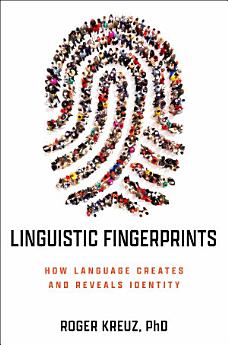Linguistic Fingerprints: How Language Creates and Reveals Identity
Aug 2023 · Simon and Schuster
Ebook
256
Pages
family_home
Eligible
info
reportRatings and reviews aren’t verified Learn More
About this ebook
How much of ourselves do we disclose when we speak or write? A person’s accent may reveal, for example, whether they hail from Australia, or Ireland, or Mississippi. But it’s not just where we were born—we divulge all sorts of information about ourselves and our identity through language. Level of education, gender, age, and even aspects of our personality can all be reliably determined by our vocabulary and grammar. To those who know what to look for, we give ourselves away every time we open our mouths or tap on a keyboard.
But how unique is a person’s linguistic identity? Can language be used to identify a specific person? To identify—or to exonerate—a murder suspect? To determine who authored a particular book? The answer to all these questions is yes. Forensic and computational linguists have developed methods that allow linguistic fingerprinting to be used in law enforcement. Similar techniques are used by literary scholars to identify the authors of anonymous or contested works of literature. Many people have heard that linguistic analysis helped to catch the Unabomber, or to unmask an anonymous editorialist—but how is it done? LINGUSISTIC FINGERPRINTS will explain how these methods were developed and how they are used to solve forensic and literary mysteries. But these techniques aren’t perfect, and the book will also include some cautionary tales about mistaken linguistic identity.
But how unique is a person’s linguistic identity? Can language be used to identify a specific person? To identify—or to exonerate—a murder suspect? To determine who authored a particular book? The answer to all these questions is yes. Forensic and computational linguists have developed methods that allow linguistic fingerprinting to be used in law enforcement. Similar techniques are used by literary scholars to identify the authors of anonymous or contested works of literature. Many people have heard that linguistic analysis helped to catch the Unabomber, or to unmask an anonymous editorialist—but how is it done? LINGUSISTIC FINGERPRINTS will explain how these methods were developed and how they are used to solve forensic and literary mysteries. But these techniques aren’t perfect, and the book will also include some cautionary tales about mistaken linguistic identity.
About the author
Roger Kreuz is an Associate Dean of the College of Arts & Sciences at the University of Memphis and a Professor in the University's Psychology Department. He works mainly in experimental psychology, cognitive psychology, and psychology of language. He earned his Ph.D at Princeton University. In addition to two edited books, and over fifty journal articles and book chapters, He has been an author on about a hundred research presentations at national and international conferences. According to Google Scholar, his publications have been cited more than 5,000 times. He has fellow status in three professional organizations: The Association for Psychological Science, the Psychonomic Society, and the Society for Text and Discourse.
Rate this ebook
Tell us what you think.
Reading information
Smartphones and tablets
Install the Google Play Books app for Android and iPad/iPhone. It syncs automatically with your account and allows you to read online or offline wherever you are.
Laptops and computers
You can listen to audiobooks purchased on Google Play using your computer's web browser.
eReaders and other devices
To read on e-ink devices like Kobo eReaders, you'll need to download a file and transfer it to your device. Follow the detailed Help Center instructions to transfer the files to supported eReaders.






